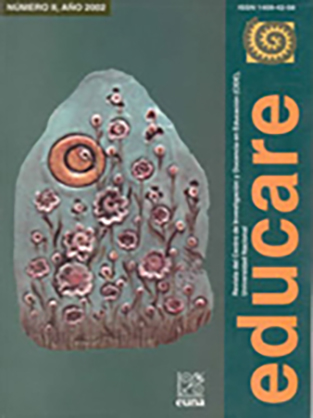Sistematización de la construcción colectiva de un proceso de selección de postulantes a las carreras del CIDE: 2002
DOI:
https://doi.org/10.15359/ree.2002-2.4Abstract
The Center for Research and Teaching in Education -CIDE- developed a rather novel admission system to select students, with an appropriate profile, interested in enrolling in the different career options offered by CIDE in 2002.
A lot of people filed their application forms to participate in the admission process, and it was not viable to admit them all, due to limited resources and space. In search for excellence, an interdisciplinary team of academics researched and defined the future educat´s profile. They also designed the appropriate instruments to select the students, taking into account the Costa Rican legislation. The objective was to select students with the necessary aptitude and attitude to become professionals in the different educational fields.
References
Allington, R.L. y Johnston, P.H. (2000). What do we know about effective fourth grade teachers and their classrooms? Para ser publicado en: Roller, C. (Eci.) (2001). Learning to teach reading: setting the research agenda. Newark: DE: Intemational Reading Association. [On-line] Available: http://cela-albany.edu/4thgrade/mam.htlm
Darling-Hammond, L, Wise,A.E., Klein, S.P. (1995). A license to teach: building a profession for the 21". century schools. Boulder, Colorado: Westview Press.
Zúñiga, l. y León, A.T. (1998) Relaciones Interpersonales en el Aula.
Informe Final de Investigación. Heredia, Costa Rica: Universidad Nacional.
Published
How to Cite
Issue
Section
License
1. In case the submitted paper is accepted for publication, the author(s) FREELY, COSTLESS, EXCLUSIVELY AND FOR AN INDEFINITE TERM transfer copyrights and patrimonial rights to Universidad Nacional (UNA, Costa Rica). For more details check the Originality Statement and Copyright Transfer Agreement
2. REUTILIZATION RIGHTS: UNA authorizes authors to use, for any purpose (among them selfarchiving or autoarchiving) and to publish in the Internet in any electronic site, the paper´'s final version, both approved and published (post print), as long as it is done with a non commercial purpose, does not generate derivates without previous consentment and recognizes both publisher's name and authorship.
3. The submission and possible publication of the paper in the Educare Electronic Journal is ruled by the Journal’s editorial policies, the institutional rules of Universidad Nacional and the laws of the Republic of Costa Rica. Additionally, any possible difference of opinion or future dispute shall be settled in accordance with the mechanisms of Alternative Dispute Resolution and the Costa Rican Jurisdiction.
4. In all cases, it is understood that the opinions issued are those of the authors and do not necessarily reflect the position and opinion of Educare, CIDE or Universidad Nacional, Costa Rica. It is also understood that, in the exercise of academic freedom, the authors have carried out a rogorous scientific-academic process of research, reflection and argumentation thar lays within the thematic scope of interest of the Journal.
5. The papers published by Educare Electronic Journal use a Creative Commons License:














 The articles published by Educare Electronic Journal can be shared with a Creative Commons License:
The articles published by Educare Electronic Journal can be shared with a Creative Commons License: 



